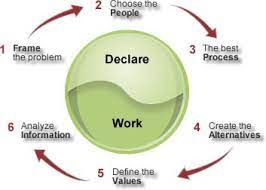Decision making
Effective decision making is an essential aspect of both personal and professional life. Every day, we make decisions that impact our lives and those around us. While some decisions are straightforward and can be made with minimal thought, others are complicated, requiring a more structured approach. In such situations, intuition and reasoning play a vital role. Intuition, also known as gut feeling, is a sense of something that is not always based on reality but personal values and perception. While it can be helpful in making quick decisions, it is not always reliable. Reasoning, on the other hand, is based on facts and figures, ignoring emotional aspects. It is essential to strike a balance between the two when making complicated decisions, such as building a home, which requires both intuition and reasoning. However, several factors can hinder effective decision making. One such factor is not having enough information, which can lead to decisions made without any basis. On the other hand, having too much information can lead to analysis paralysis, causing tactical delays in organizational decision making. To combat this, it is crucial to gather relevant and up-to-date information and set clear time-scales for decision making. Another factor that can affect decision making is having too many people involved. When everyone has their own values and views, it can be challenging to come to a consensus. In such situations, it is vital to identify and consider the views and values that are important to the decision. Vested interests can also hinder effective decision making. It can be challenging to find out who has a vested interest and how it can impact the decision. In such cases, seeking the opinion of someone who is in a similar situation can be helpful. Emotional attachments can also impact decision making. The prospect of change can be overwhelming, leading to deciding not to decide. In such situations, it is essential to involve those who will be impacted by the decision and communicate the benefits of the change. It is crucial to prepare a plan, get buy-in, implement, monitor and complete the decision. On the other hand, not having any emotional attachment can lead to not caring about the decision. In such cases, a structured decision-making process can be helpful, reducing complications and clearly defining the number of decisions required and the deadlines. The decision-making framework follows a seven-stage model, starting with listing possible solutions or options, setting a timeline, and assigning responsibilities. The third stage involves information gathering, followed by managing risks and deciding on values. The sixth stage is weighing up the pros and cons, assessing the situation's good and bad aspects. The final stage is making the decision, with sufficient data and analyzing the advantages and disadvantages. Once a decision is made, it is essential to keep records and communicate the decision to everyone involved. In conclusion, effective decision making requires a balance between intuition and reasoning. It is essential to gather relevant and up-to-date information, set clear time-scales, and consider the views and values of those involved. By following a structured decision-making process, one can make informed decisions that lead to positive outcomes.













No comments
Post a Comment